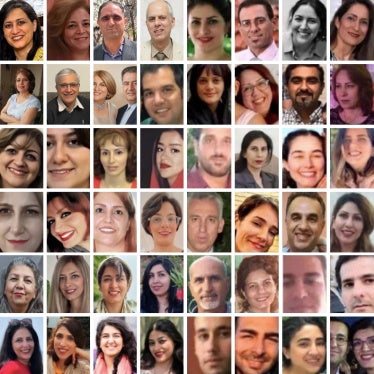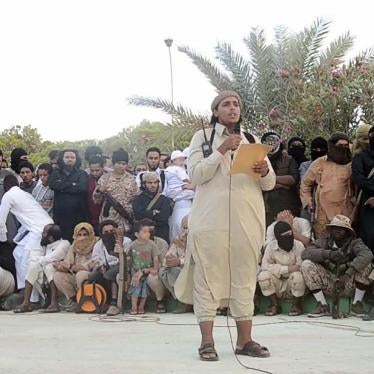(Beirut) – Iranian authorities should ensure that prison sentences against 20 Baha’is unlawfully convicted of national security crimes are overturned. Security and intelligence forces arrested the group of 20 in July 2012. Authorities should also halt the Revolutionary Guard bulldozing of an old Baha’i cemetery in Shiraz.
The appellate court ruling, issued on April 13, 2014, follows lower court convictions of the group in 2013 on charges of “propaganda against the state” and “propaganda on behalf of groups or organizations acting against the state.” Several defendants told Human Rights Watch that the convictions followed prolonged periods of solitary confinement and interrogation by Intelligence Ministry agents, who subjected detainees to physical and psychological ill-treatment.
“These transparently political charges make it painfully clear that authorities have targeted the Baha’is not for any crime but because of their religious beliefs,” said Joe Stork, deputy Middle East and North Africa director. “It’s hard to understand how members of the judiciary can justify such religious intolerance.”
The ruling issued by branch 1 of Yazd’s Appellate Court, with an average of two to three years per defendant, stems from a campaign targeting Baha’is in central Iran. On July 31, 2012, Intelligence Ministry agents raided the homes and businesses of the 20 Baha’is in the cities of Yazd, Esfahan, Arak, Shahinshahr, Vilashahr, and Kerman. Defendants who spoke to Human Rights Watch described how the agents searched their homes, confiscated personal belongings including birth certificates, bank statements, and religious material, then arrested them and took them to detention facilities in Yazd.
The defendants are out on bail. Fariborz Baghi, who was sentenced to two years in prison and given a one year suspended sentence, told Human Rights Watch that over the course of a month in a Yazd detention facility: “I was subjected to a lot of psychological and emotional pressure…. They told me if you don’t confess to everything we will bring your daughter and your son here too…they did not say what they would do to them.” Baghi’s wife, Nategheh Jafari Naeimi, told Human Rights Watch that agents arrested her and took her to a women’s detention facility, where she was in solitary confinement for 17 days during her interrogation. They later released her on bail.
Another defendant, Iman Rashidi, told Human Rights Watch that one of his interrogators insulted and cursed him and other Baha’is, and struck him on the head from behind on two occasions. Rashidi said he was in solitary confinement for 15 days, and was allowed to contact his family only on his 21st day of detention. The court sentenced Rashidi to three years in prison and a one year suspended sentence.
Several defendants said that during the two-day lower court trial, which lasted about three hours each day, the government provided little evidence substantiating the charges against them:
The judge first read the charges against us aloud and then asked if we wished to defend ourselves. Then he immediately asked us and our lawyer to provide our last defense. I felt as if they had already made a final decision and had issued the verdict before our trial, and before hearing our words and our lawyer’s defense.
Another defendant, who wished to remain anonymous, said that several days after the lower court issued its verdict, a member of the judiciary told him: “In the Islamic Republic of Iran, the constitution does not acknowledge any rights for you. You are not considered citizens. If it were up to me you would not have the right to live, either.”
Mehran Amirabadi, a 45-year-old Yazd resident who was sentenced to a year in prison and a one year suspended sentence, said that the judge accused the group of being in touch with Israel without providing any proof:
They never provided evidence for the charge of “propaganda against the regime”. They just said that all 20 of us were part of an organized network. I asked the judge what evidence substantiated the charges against us. The judge looked at the prosecutor’s representative, who nodded his head. Then the judge answered that the representative of the prosecutor will inform you later.... How can I defend myself if the prosecutor’s representative is going to inform me of the evidence for my charges later? Then, the judge related us to Israel, and [said that] we are in touch with Israel without any proof, evidence, and witness.
Haifa, in present-day Israel, is the faith’s administrative headquarters since 1868, when Haifa was under Ottoman rule. The Iranian government has repeatedly used the connection to accuse Baha’is in Iran of spying for Israel, with which Iran has hostile relations.
The Baha’i International Community says that as of December 2013, there are 136 Baha’is that are in prison in Iran solely on religious grounds. Among those are the seven former Baha’i leaders, who are nearly six years into 20-year sentences in a trial that fell short of international standards. The seven are: Fariba Kamalabadi, Jamaloddin Khanjani, Afif Naeimi, Saeid Rezaie, Mahvash Sabet, Behrouz Tavakkoli, and Vahid Tizfahm.
Those arrested on July 31, 2012, are: Farahnaz Misaghian Ardakani, Shabnam Mottahed, Iman Rashidi Azabadi, Fariba Ashtari, Nategheh Jafari Naeimi, Shahram Fallah, Navid Haghighi Najafabadi, Khosro Dehghani Mohammadi, Farah Baghi Asrabadi, Mehran Eslami Amirabadi, Azam Motahari, Azar Meidokht Toloui Mehdiabadi, Safa Golshan, Enayatollah Taghipour, Sasan Haghiri, Shahram Eshraghi Najafabadi, Tahereh Rezaeidashti, Naghmeh Farabi, Vida Haghighi, and Fariborz Baghi.
In a separate development, on or around April 21, 2014, authorities began excavating an old Baha’i cemetery, “Golestan-e Javid” (Eternal Paradise), in the southern city of Shiraz. Two Baha’i residents, who have family buried in the cemetery, told Human Rights Watch that the Revolutionary Guard began bulldozing the cemetery despite efforts by the community to prevent demolition of the site.
Defacing and destruction of religious or sacred sites, including cemeteries where Baha’i leaders and ordinary members of the community are buried, has also been part of the systematic campaign of government repression targeting Iran’s Baha’i community since the 1980s, Human Rights Watch said.
One resident, who wished to remain anonymous, said that his mother’s cousin, who was among a group of Baha’is executed by the government in the early 1980s, was buried in the cemetery, but that since the government confiscated the property in the 1980s the Baha’i community had not been able to use the site for burials. The resident also said that local Baha’is had complained to various governmental authorities to stop the excavation, to no avail.
In a recent interview with the Persian-language Radio Farda, a Baha’i International Community spokesperson, Simin Fahandej, said that the land on which the Baha’i cemetery sits is now owned by a Revolutionary Guard, and that three years ago it announced plans to build a cultural and sports complex on the site. The cemetery’s burial ground holds the remains of more than 900 Baha’is, including “10 women who were hanged in 1983 for their refusal to recant their Baha’i beliefs,” the Baha’i International Community said in a May 8, 2014 statement.
According to the Baha’i International Community, between 2005 and 2012 “at least 42 Baha’i-owned cemeteries were attacked in some manner.”
“The targeting and harassment of Baha’is, both living and dead, shows how deeply entrenched the government’s intolerance is against Iran’s Baha’i community,” Stork said. “Those who are supposed to be protecting the Baha’i community should call a halt to this campaign of repression.”








